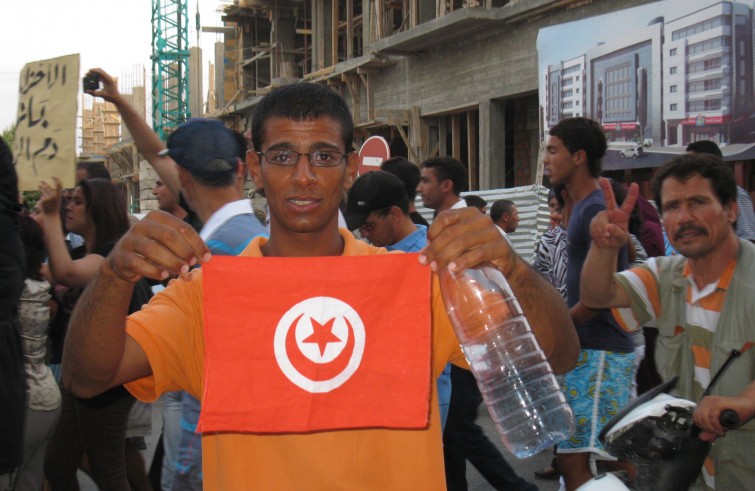Migrations
Once a Country of departure of migrants, today Tunisia is a Country of transit towards Libya, (but some still manage to leave from the ports in the north), whilst trying hard to establish democratic stability and prompt development, after the turmoil of the Arab Spring and the terror attacks of two years ago. We broached the issue with Msgr. Ilario Antoniazzi, archbishop of Tunis since 2013

Tunisia, once a Country of departure of barges packed with migrants headed to Lampedusa today is a Country of transit towards Libya, except in rare cases. Sadly and unfortunately no less than 6-7000 Tunisians have gone to fight with ISIS; radicalised militants who sooner or later are likely to return home. The Country has been spared terror attacks for the past two years but it is far from safe and serene. “The future is more frightening than the present”, said the archbishop of Tunis Monsignor Ilario Antoniazzi, in Rome for a few days. Tunisia’s Catholic Church is one of the few outposts of aid to migrants, most of whom arrive from sub-Saharan Countries. It struggles to avert the dangerous journeys across the Mediterranean Sea, but in most cases, before venturing out into the last part of the journey, migrants ask the bishop to impart a special blessing: “Sometimes we receive a phone call from Europe – he said – . But in many cases the phone stops ringing.” For Monsignor Antonazzi the Mediterranean is not the largest cemetery in the world. “There is an even larger one: Sahara.”

Have people stopped emigrating from Tunisia? Tunisia has become a transit Country. People no longer leave for the island of Lampedusa. Controls have grown stricter compared to the past. Every once in a while some people leave, but we don’t know if they manage to reach their destination. Migrants arrive here, traffickers accompany them to the border with Libya where a car brings them to the shore where they wait for the first opportunity – after one or two months – to leave for Europe. Some migrants work in the many small port towns in the north of Tunisia until they have enough money to leave. Every once and a while the Police inform us that people have drowned at sea and need to be buried.
What are the living conditions of sub-Saharan migrants? Here the migrants are exploited like anywhere else. To them, the Church is a point of reference. They leave their home countries in the awareness that it’s the only place that respects them, girls in particular. We try to help them, not only in the emergency situation but also to give them a stable, dignified life. I’d rather not give alms. I prefer to offer a small project that they may live on. I ask them to eventually return the money so that it may be used to help other people. It’s more dignified. Some return the entire sums, some half of it, some others none at all. It does not matter provided they understand that we don’t give aid in the form of charity but we offer them concrete help to lead a dignified life.
They are all aware of the risks at sea, so why do they all want to go to Europe? They leave with the idea that Europe is a paradise knowing that they will no longer return to their home Country. They intend to leave even when they see their travel companions drown. They lack the courage to return home and admit: “I was afraid.” They see it as a disgrace. They need large sums of money to pay the journey. Some of them are forced to sell their fields and sometimes even their homes. If they reflected more they would realize that with the same amount of money they could finance a project in their home Country.
Since 2011 and for a few years the refugee camp of Choucha on the border with Libya has welcomed thousands of migrants forgotten by everyone. The Catholic Church was one of the few bodies that delivered aids. What happened in the meantime? For the Government of Tunisia the camp is closed. It doesn’t exist. But some two hundred people continue living there, abandoned in the midst of nowhere. Most of them are Libyans loyalists of Gaddafi’s ex regime, along with a few sub Saharan Africans. Rather than crossing the desert and going back they prefer to stay in the camp in the hope that the situation will change. Our Caritas priests are among the few allowed to go there. They bring aids, food, clothing items. The Police turn a blind eye.

What about Tunisia’s Arab Spring? It’s over. There never was an Arab spring – although Tunisia suffered less damage compared to other Countries. Here there is a spirit marked by freedom of thought. It’s too early to call it democracy because democracy is the end of a long journey reached with great efforts. But the situation has changed.
Have the terror attacks of two years ago – that depressed tourism and the economy – finally ended? We are told that there is terrorism in Tunisia, but it should be remembered that the last attack dates back to two years ago, while terror attacks were perpetrated in Europe only recently. We are told that tourism is recovering. Indeed, every now and then tourist buses do arrive, along with some cruise ships. Our Church here has no problem. We have never been threatened. I am free to go where I please, I don’t have an armed escort. However
Tunisia is the smallest Country in North Africa with the highest number of fighters recruited on “the altar of martyrdom”, as it called by Daesh/Isis militants. Sooner or later they will return home.
These people have grown used to guerrilla warfare and war. A few cells have already returned. The police said they are controlling them, but until when?
Is this what worries the most today? The future is more frightening than the present. But thinking about it and worrying is of no use. When I am asked about the situation in Tunisia I look at my watch and reply: it’s 2:45, until now everything has been OK, but I don’t know what will happen at 3:00.
We live in peace, but we are not serene for the future.
We are not complaining, but it would be wrong to say that all problems have been solved. Moreover, when asked if Tunisian terrorists should return, the population is divided. Many people say: “They’re our sons, they must return and be put into prison.” But this would require building an equal number of prisons since they are estimated at about 6-7000 youths. Others say “why bring them back home, just to have problems? Who will be responsible for them?” This prospect is frightening. I have no solution to this problem. They all have Tunisian passports and have the right to return to the Country.

What is Tunisia’s priority today? As a Church we try to help all transit migrants. We try to convince them that returning home level-headed is preferable to dying in the Mediterranean Sea. But it’s not easy.
Many people ask for a special blessing to cross the sea.
We devote a lot of time speaking about it with them, and if need arises we impart the blessing. Sometimes we receive a phone call from Europe informing us: “I managed to arrive.” But
Many times the phone stops ringing. It’s very sad.
One thing that is not being said is that
Not only the Mediterranean is a large cemetery. There is an even greater one, and it’s called Sahara.
When a boat leaves sooner or later we learn about it. But we don’t know how many of those on their way to Tunisia died of thirst in the desert, were raped or abandoned. Their stories are tragic.